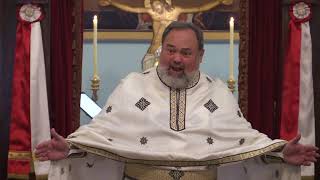“OK, so let me get this straight? You just threw yourself in front of the punch and took it for the guy? And look, the only thing you got out of it was a black eye!”
My buddy just didn’t understand why a fellow officer would put himself in harms way for a “civilian” during a domestic dispute call. After all, what was in it for him.
But of course my buddy missed the point altogether. There really is something powerful about standing up for others, even when it doesn’t look like there is an immediate benefit for you. Something happens in the soul of a person when they stand up for others. Something powerful, something wonderful.
And that something is deep in the foundational image of we humans.
The truth is scientists and sociologists have, for years, tried to study the physical and psychological affects and effects of altruism both on society as a whole and even on the people directly involved. And their studies have found some amazing results. Society is strengthened by acts of selfless care. Stories abound and the internet pulses with messages about “paying it forward” or the anonymous donation that changes everything for a person, a group, or a charity. They’ve even found that the absolute “rush” that the donor or the good deed doer experiences reinforces this kind of behavior in we humans. Whole studies have found that donors actually get a sense of wonderful well being when they sacrificially give to a cause they believe in strongly. In fact, this psychological reinforcing behavior gets stronger as the person becomes more generous!
Why is that?
In today’s Scripture Lesson we read the story of Abraham “negotiating” with God over the destruction of the cities of Sodom and Gomorrah. It’s a fascinating read. Look at Genesis 18:20-33 and watch as Abraham is asking God to spare the cities if the Lord finds righteous people in these cities. Abraham’s biggest concern is for his nephew Lot and his family who live in this area.
Read this:
Then the LORD said, “Because the outcry against Sodom and Gomorrah is great and their sin is very grave, I will go down to see whether they have done altogether according to the outcry which has come to me; and if not, I will know.” So the men turned from there, and went toward Sodom; but Abraham still stood before the LORD. Then Abraham drew near, and said, “Wilt thou indeed destroy the righteous with the wicked? Suppose there are fifty righteous within the city; wilt thou then destroy the place and not spare it for the fifty righteous who are in it? Far be it from thee to do such a thing, to slay the righteous with the wicked, so that the righteous fare as the wicked! Far be that from thee! Shall not the Judge of all the earth do right?” And the LORD said, “If I find at Sodom fifty righteous in the city, I will spare the whole place for their sake.” Abraham answered, “Behold, I have taken upon myself to speak to the Lord, I who am but dust and ashes. Suppose five of the fifty righteous are lacking? Wilt thou destroy the whole city for lack of five?” And he said, “I will not destroy it if I find forty-five there.” Again he spoke to him, and said, “Suppose forty are found there.” He answered, “For the sake of forty I will not do it.” Then he said, “Oh let not the Lord be angry, and I will speak. Suppose thirty are found there.” He answered, “I will not do it, if I find thirty there.” He said, “Behold, I have taken upon myself to speak to the Lord. Suppose twenty are found there.” He answered, “For the sake of twenty I will not destroy it.” Then he said, “Oh let not the Lord be angry, and I will speak again but this once. Suppose ten are found there.” He answered, “For the sake of ten I will not destroy it.” And the LORD went his way, when he had finished speaking to Abraham; and Abraham returned to his place.
Notice how God speaks to His chosen leader of the chosen nation to come from him. He speaks as a Companion, not as master to slave. He has come to Abraham in the form of three angels. Abraham has provided hospitality to these Guest (number and syntax purposeful and correct) and these angels have told Abraham and Sarah that they were going to conceive a child in their old age, thus beginning Abraham’s lineage and the nation of Israel. This scene is where we get the icon of the Hospitality of Abraham in our Orthodox Church as a foreshadowing of the revelation of the Holy Trinity.
God reveals to Abraham that He is going to judge these two cities for their sinful behavior, and Abraham asks God “Wilt thou indeed destroy the righteous with the wicked? Suppose there are fifty righteous within the city; wilt thou then destroy the place and not spare it for the fifty righteous who are in it? Far be it from thee to do such a thing, to slay the righteous with the wicked, so that the righteous fare as the wicked! Far be that from thee! Shall not the Judge of all the earth do right?” Genesis 18:23-25
God promises not to destroy the righteous with the wicked if He finds fifty righteous there. But Abraham is nervous, so he keeps negotiating and gets the promise of God not to destroy the cities if He finds at least ten righteous.
We all know the Lord didn’t find ten righteous in the cities, but Lot and his children were spared.
So what drove Abraham to fight for people he didn’t know? And why did God allow such a conversation? And why put it in the eternal scriptures for all to see and learn from?
Because God’s greatest desire is for humanity to know the ultimate purpose for our existence and that is to become like our Creator. And our Creator, my dearest, never does anything for Himself. His every action, every word, every effort is always and forever for you and me. And God knows the best way to restore and encourage us in our journey to become like Him is to call us to that same kind of selfless behavior. God allows Abraham to negotiate with Him, not to give the impression that God is able to be manipulated, but that God loves and respects Abraham as His Friend and wants to build into Abraham the character saving aspect of selfless and sacrificial love.
Today, as we see the completion of Great Lent and the onset of Holy Week coming, as we approach that moment in human history where He Who is Love Himself takes His Human flesh to the Cross as the ultimate act of selfless love and rescue for others, let us dare to love so selflessly that we even dare to love those who cannot return our love. Let us love those who are their own worst enemies. Let us love “those who love us and those who hate us.” Let us accept the “high calling of God in Christ Jesus” (see Philippians 3:14) to become like our Creator in selfless love and care for even those who reject us. Today, let us accept the calling to become “by grace, what Christ is by nature” to be Orthodox on Purpose.


